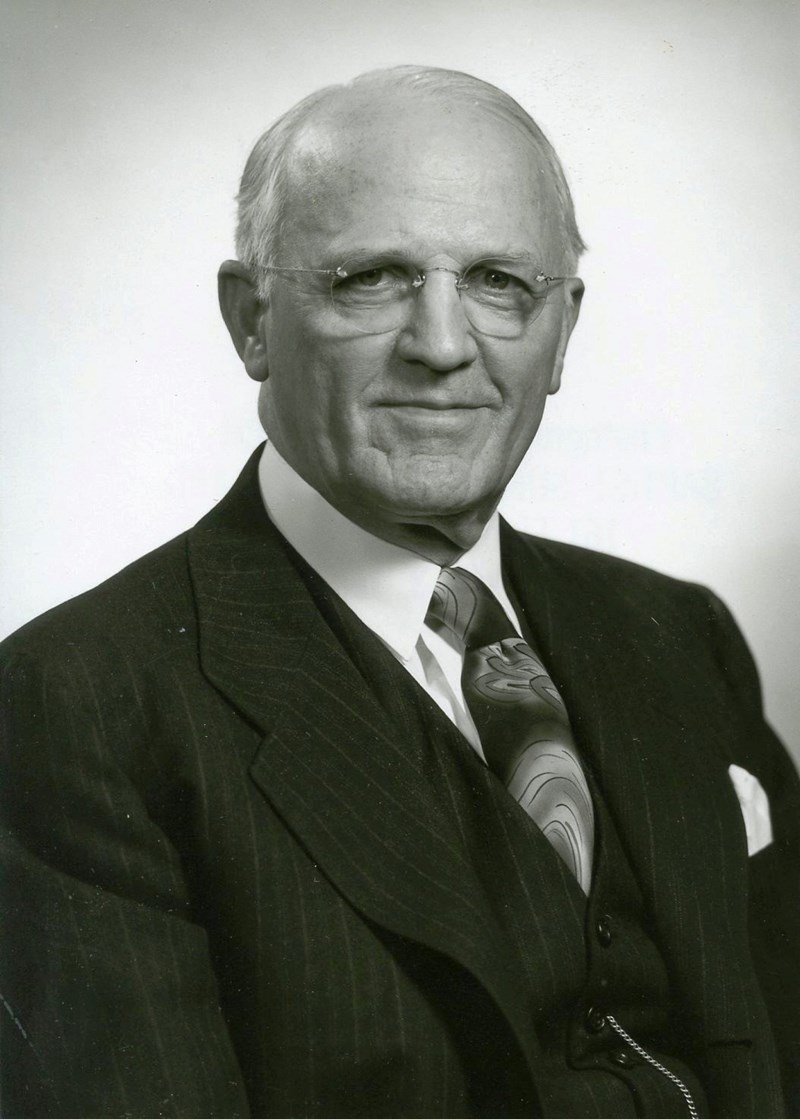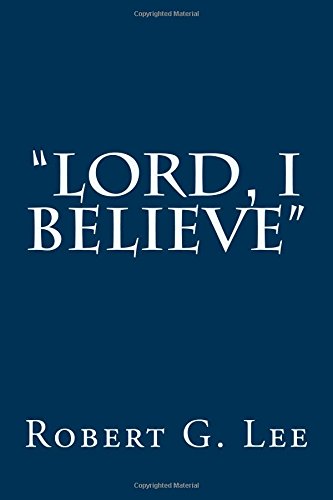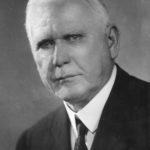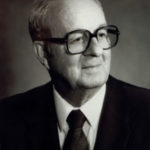Description
“LORD, I BELIEVE”
BY
ROBERT G. LEE
Formerly Pastor of Bellevue Baptist Church, Memphis, Tenn.
2014
TO
MY WIFE BULA GENTRY LEE
WHOSE LOVING AND UNSELFISH COMPANIONSHIP HAS BEEN TO ME A HIVE OF SWEETNESS, A FOUNTAIN OF JOY, A LAMP OF LIGHT, A HARP OF MUSIC, AND A GARDEN OF RARE FLOWERS, ENABLING ME TO FACE LIFE’S PERILOUS SITUATIONS WITH STRENCTH AND TO FIGHT life’s BATTLES WITH A BRAVER HEART.
TO HER
THIS VOLUME IS DEDICATED BY THE AUTHOR.
“LORD, I BELIEVE”
(Mark 9:24)
Just recently I preached a series of sermons on “Marching with Moses.” Many who heard these sermons asked questions— earnest questions some, critical questions some—by letter and by word of mouth. One question came as a result of my dwelling on verses ten and twelve in the seventh chapter of Exodus, which verses declare:
“And Moses and Aaron went in unto Pharaoh, and they did so as the Lord had commanded; and Aaron cast down his rod before Pharaoh and before his servants, and it became a serpent. … Now the magicians of Egypt . . . they cast down every man his rod, and they became serpents; but Aaron’s rod swallowed up their rods.”
And this was the question asked of me: “Do you really believe that Aaron’s rod became a serpent and swallowed up the rods of the magicians when, and if, their rods became serpents, too?”
My answer—instant, unhesitant, unabashed, unstudied, undoubting—was: “Yes, I believe it.”
And I do believe it. Not because the serpent played a conspicuous part in Egyptian mythology and was the emblem of one of their goddesses and was, in particular, the sign of royalty, being the symbol of royal and divine power on the diadem of every Pharaoh, and was therefore the symbol of the Egyptian power, but because I believe— as believe others whose shoe laces I am not worthy to tie or to unloose—that the fundamental postulate of all rational thinking is the fact of God. I accept the fact of an omnipotent, omniscient, omnipresent God— and that makes all miracles credible, makes it so that nothing in the Bible staggers me. I believe—because I accept the fact of God. And I do not believe God is an impotent and puzzled bell-hop running up and down the corridors of the house he designed by his omniscience and created by his omnipotence, having lost the key to some of the mystery rooms of his own house. It is impossible for him to be baffled or bothered or chained by the physical elements.
“You don’t believe the myth about the garden of Eden—do you?”
Yes, I believe. And as much and as certainly as I believe that there was a garden on the old farm where I worked as a boy in the noonday’s burden and heat; a garden where the honeysuckles, voluntary philanthropists of fragrance, scattered their perfumes on the summer air; a garden where the birds, feathered Beethovens of apple boughs, feathered Homers of hawthorn hedges, feathered Tennysons of twigs, shook silver song from throats all atremble with joy; a garden where the com had ears and heard not, the potatoes eyes and saw not, the cabbages heads and thought not.
But I resent the insertion of the word “myth” in the above question. Though there was mystery in that old farm garden, there was nothing mythical in or about that garden and the roses of the garden that opened wide their ruby hearts; nothing mythical about the lilies of the garden, lilies which bared their white bosoms all un- abashed to the eyes of all; nothing mythical about the garden’s good black earth which gave abundant sustenance to vegetables in abundance and to vines in riotous entanglement; nothing mythical about the blue birds which, like winged flowers dipped in vats of heavenly blue, chirped happily when God annually spread his carpets of green and hung his curtains of green.
When a man, a college student of no mean ability, asked me the question just mentioned and I answered, in substance, as above, he said: “You never did see Eden, did you?—you never did walk in that garden, did you?”
No. I have never walked in that place which the serpent, subtly, and sin, destructively and blightingly, entered long, long ago. But God walked there (Gen. 3:8 “The Lord God walking in the garden”).
And, for that matter, there are many places I believe in, many places which I know are not mythical, even though I have never seen them and though I have never seen anybody who has seen them. And there are folks, hundreds of them, thousands of them, some living now, some long dead, in whose existence I believe, though mine eyes never beheld them.
I know that Napoleon lived in many places and in Paris, in particular, and then died on lonely St. Helena,—died “a chained Prometheus, a world exultant at his fall!” But I never saw Paris. I have never seen St. Helena. And I never did talk with Napoleon—never did walk with him, never did see him on that barren isle where his life went out as a noonday sun reduced to the flicker of a tallow candle. I must take somebody’s word for all I know about Napoleon. And I am just as wise to believe what the writers of the Bible tell me of the men and the events of far-away ages as I am to believe what Victor Hugo and Tom Watson and Parkman and Bancroft and others who preambulate around the pole of veracity tell me of the men and the events of recent years.
And I believe that George Washington lived. But I never looked upon him, never saw his eyes flash, never heard his voice, never walked with him on the lawns of Mt. Vernon, never knelt with him in prayer amid the snows of Valley Forge. Were I to declare that I do not believe in George Washington I would but announce that I believe many men are liars.
And I believe that a wonderful man named Socrates taught in Athens, living to see the young men of Athens aroused, and died in the narrow confines of a small Athenian prison, the hemlock fresh on his lips and murderous in his blood. But to believe in Socrates I must believe what somebody wrote many centuries ago, even as I must believe what others whom I know not have said to believe that a man named Julius Caesar laid the foundation stones of the world’s greatest empire—centuries ago.
And I believe, too, that there is a battlefield called Waterloo, though I heard not one gun that was fired there and not one groan that was uttered there and not one dying whisper that was breathed there that awful June day—long ago. To deny that there was such a battle is to declare that historians are impostors.
And I believe, moreover, that a great genius by the name of Shakespeare lived in England and fingered a pen from which wisdom and verses dropped like “golden pollen from the stems of shaken lilies”; that a woman called Florence Nightingale lived and bound up many battle wounds; that a blind woman named Fanny Crosby wrote many immortal hymns; that a man named Ingersoll, with the effrontery of a thief who comes but to steal and to kill and to destroy, went up and down our land—East, West, North, South—shooting arrows tipped with fire at the Bible.
But none of these whom I have named have I seen in the flesh. Few only of the places where they once walked have I visited.
Yet no doubt enters my mind as to them as to the things they did. And I am just as reasonable to believe what the Bible says about the garden of Eden as I am to believe anything historians have said about any of the persons and any of these other matters I have mentioned—or have not mentioned. I am just as wise to believe what Moses, writing under the good hand of God, tells me about the parting waters of the Dead Sea, saying, “And the Lord made the sea dry land, and the waters were divided” (Exodus 14:21) as I am to believe what a New York editor wrote of Henry Grady, saying, “Grady was an animated aurora with all the variations of a luminous sunset, and he managed in twenty minutes to bathe two antagonistic sections in fraternal light.”
“You don’t believe the sun and the moon stood still—do you?”
Yes, I believe that when Joshua said in the sight of Israel, after he had spoken to the Lord, “Sun, stand thou still upon Gibeon, and thou, Moon, in the valley of Ajalon” that “the sun hasted not to go down about a whole day” (Joshua 10:12-13). Because the God who “set a tabernacle in the heavens for the sun” (Psalm 19:4) and who “hang- eth the earth upon nothing” (Job 26:7) can lengthen the day and shorten the night, or dispense with both for the victorious struggles of his people. If he who “by wisdom hath founded the earth and by understanding hath established the heavens” (Prov. 3:19) can hang the earth upon nothing, he can make the earth stop turning on its axis and stop whirling around the sun.
In 1833 there was a day known as the “Dark Day.” Astronomers have never been able to explain that day. Workmen, when midnight came down in the daytime, went to their homes. Courts adjourned. Legislative sessions closed. Fowls of the daytime went to roosting places in the morning. Creatures of the night time came forth. There were ten thousand stars shooting here and there and everywhere like swift archangels with garments afire speeding across some uncharted dark, like torches thrown from unseen bands, like flambeaus carried by invisible and lightning-swift incendiaries. Strange day that!
Nov a man, any man, to-day who has sense enough to make a dock, certainly has sense enough to stop it. And plain commonsense, which is but the ordinary capacity to see and take things in their right light, urges me to believe that the clock is not stronger than the clock-maker—that the clock-maker can stop one wheel or stop fifty wheels or stop all the wheels, if he chooses. No machine knows more than its maker. The universe is not mightier than its God. Things created cannot master their Creator! The mighty seas are not mightier than God who holds them in the hand of his omnipotence. And if God can make and start ten thousand worlds, as be (fid in the beginning—when he started the earth on an annual journey of five hundred and fifty-eight million miles around the sun traveling at the speed of sixty-three thousand miles an hour—or make the sky shoot forth stars as a fig tree drops ripe figs in a storm, as he did in 1833—he can certainly stop two worlds, wee worlds, or big worlds, or a thousand worlds, and all worlds.
And, as Talmadge once said in substance to Ingersoll, if God can engineer a train of ten thousand worlds or meteors, and start them without accident or collision and keep them going on schedule time, never running ahead, never running behind, never running awry, never causing catastrophe, can he not control two carriages of light, and by putting down a golden brake stop the sun, and by putting down a silver brake stop the moon?
And I say, if man by means of the stop watch can divide seconds into fractions of a second, if man can make a messenger boy of the lightning and conquer time and фасе, God can prolong the day, advance the night and advance die dawn earlier than their appointed rimes, or adjourn die night until after its time or retard the dawn, or dispense with both. Yes, I believe.
If our astronomers, with their man-made lenses, can learn the exact schedule of comets and view landscapes fifteen million miles away and tell us years ahead the exact second the sun will go into total eclipse, cannot God do all that the tenth chapter of Joshua relates? Surely. God, who made this physical universe, from the mightiest whirling orb and fixed star to the minutest dancing electron, keeps it on the move,—keeps it going furiously, even tremendously. But that does not affirm he could not stop all things in motion—if he saw fit.
Astronomers tell us that Alpha Centauri, our nearest fixed star, is so far away that if we were to get on a train and take our Sunday School for a picnic (were it possible to build a railroad to Alpha Centauri) and travel at the rate of a mile a minute, we would reach the picnic grounds in forty-eight million years. At the rate sound travels, if some of the sweet singers in our choir could be placed in Alpha Centauri and were to sing a song, that song would reach our ears in three million eight hundred thousand years. A strand of a spider’s web from a cocoon reaching from here to our nearest fixed star would weigh five hundred tons.
And the Almighty God who put that fixed star yonder, so far away; the omnipotent God who “drew the blue curtains of the night across the windows of heaven and pinned them together with such marvelous star clusters”—that God can make a shepherd’s crook to become a serpent and can make it swallow other serpents endlessly. I believe. “The heavens are thine, the earth also is thine; as for the world and the fullness thereof, thou hast founded them” (Psalm 89:11).
If to-day or to-morrow, or in ten or a thousand years, something may happen which is not in accord with my slight experience, with my imperfect knowledge of the universe—which is, or appears to be, in direct opposition to them—then all at once any miracle becomes possible, to-day, yesterday, or tomorrow, whether it be the sun standing still in the sky without any consequent disturbance in the solar system, or a poor child finding a penny in the dust in answer to its prayer.
Who spoke as above, spoke words of wisdom. Do not we who believe in a God, believe of necessity in a miracle? Would not a God, who was obliged to obey self-made laws of nature with regard to the manner in which he reveals himself in his creation, cease to be a God at all? Yea, verily. God is not a victim, but a victor, in the universe of his creation. “By his spirit he hath garnished the heavens; his hand hath formed the crooked serpent . . . Lo, these are parts of his ways; but how little a portion is heard of him?” (Job 26:3-14.)






